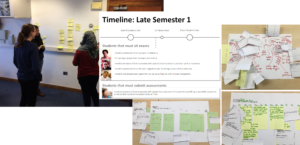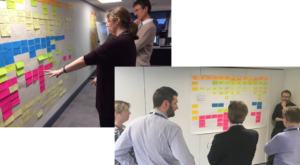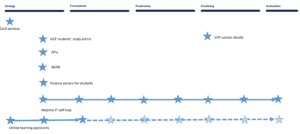UX Service – our first year
Last week I presented an update to the Digital Transformation Board on what the User Experience (UX) Service has achieved so far and what lies ahead for the coming year.
The University’s Digital Transformation Initiative is funding major IT and change projects to introduce a step change in our approach to a number of areas of IT development and management. This work underpins the Service Excellence Programme, another area of significant investment in improvement across the University.
Our new User Experience Service is one such area of activity made possible by Digital Transformation funds.
Having started in earnest around January 2017, we’re approaching the halfway point for this funding so it was a good point at which to present to the Board, looking back on achievements to date and forward to the challenges and opportunities ahead of us.
Slides and presentation summary
In my last update to the Board, pretty much a year ago, I outlined the anticipated areas of activity for the three funded years, and a simple UX maturity model against which we could gauge progress. We are on track and have progressed as I forecasted we would.
My 2017 presentation to the Digital Transformation Board – blog post
The three years’ activity overview:
- 2016/7
- UX Service consultancy model proposed
- Student Digital Experience Standards & EdGEL service proposals
- 2017/8
- UX Service consultancy model pilots
- Promotion of service & case studies
- 2018/9
- Student Digital Experience Standards (including EdGEL) service pilots
- UX Service planning for transition to BAU
More specifically, this is what we’ve worked on:
- Researched & developed a Human Centred Design Process for the University
- Proposed Student Digital Experience Standards & EdGEL operating model
- Undertaken UX consultancy pilot activities supporting a range of projects & services
- Developed & delivered UX training
- Cycle of community events established
- Promotional website & Sharepoint insight repository set up
And the next 14 months will focus on:
- Recruitment – UX consultancy and Standards staff
- More support to projects and services, more case studies
- Pilot Student Digital Experience Standards
- Refining process & evolving/expanding the EdGEL resource
- Embedding processes, integration with web governance
- Establishing a sustainable operating model
Case studies
We’ve worked with a range of projects and services and generated case studies to demonstrate the value of the support and skills we provide.
We’ve operated at a range of levels of involvement; from agency/contractor recruitment & brief development to full collaborative immersion in a project.
We’ve undertaken research and collaborative design activities with students and staff supporting the development of websites, applications and blended services.
We’ve worked across the project lifecycle from pre-project discovery to late stage usability testing.
Case studies – read more on the UX Service website
We’ve engaged staff and students for a range of reasons, undertaking interviews and usability testing as well as collaborating on ideas for new approaches through design thinking workshops.
We try to keep our project partners involved throughout the research, organising regular meet ups to walk through what we’re uncovering and setting gateway points for more formal reviews to ensure the focus of research continues to meet the needs of the team.
We generate presentations, workshops and living documents on public display, as our primary means of dissemination. These techniques are generating a good deal of engagement among project and service teams and extend the reach of the user insight to broader groups of related stakeholders.
Human centred design and standards
In tandem with undertaking consultancy work with projects, we’ve been setting out how user research and experience design activity should be undertaken through a Human Centred Design process which we’ve mapped to the Information Services development methodology.
By mapping the projects we’ve undertaken as case studies to the phases of this process, you can see that so far – in the main – we’ve supported particular points in projects rather than collaborating throughout to help ensure a user-centred end product.
The one standout exception is our work supporting Helpline, where for over a year we’ve been collaborating in a process to identify areas where support materials could be better to facilitate self help, implementing changes and monitoring the impact.
Read blog posts about our collaboration with Helpline
We’re in the relatively early stages with another project which will be enhancing the website experience of students interested in undertaking a Masters degree online.
What distinguishes these projects from all the others is that these are areas where the development work consists of content design and information architecture. We’re working on the EdWeb platform, with the CMS tool as-is. This has given us a greater degree of flexibility to plan and execute projects around user needs.
Some of the most common challenges we’ve encountered over the past 12 months when engaging with potential pilot projects to demonstrate the value of User Experience Services are:
- Situations where our starting point for discovery work has the problem & solution already defined to a great degree. Our research is challenging the project team’s perceptions of the problem and solution, but we have a fundamental issue in the way IT and digital service projects are conceived and initiated.
- There often isn’t enough time or money factored into project plans to accommodate user research, particularly in the early stages of a project
- Research can be seen as a one-off activity, rather than a fundamental ongoing activity of validation
- Customers are engaging the Service based on their exposure to our work with other projects and can be looking for a ‘product’ rather than for help to understand and solve a problem: For example, “We need some personas”
- Governance can impede a project’s ability to respond to learning in a timely fashion as we progress. We need to shift focus onto outcomes to free up project teams to solve problems rather than deliver software.
- User research can be brought in too late and seen as a validation exercise, rather than as an opportunity to learn and evolve plans and delivery
- Plans for longer term evaluation and improvement not prioritised, in particular when delivery timelines are under pressure. We need to build an appetite for ongoing appraisal of services to help us work towards goals of continuous improvement.
I proposed to the Digital Transformation Board that the primary route to overcoming these challenges was to look to the establishment of our Digital Experience Standards.
So long as we continue to operate the User Experience Service as a consultancy – an optional service that engaged customers come to – we will see change across the organisation. But this change will be incremental and largely organic. To see more immediate returns on the investment that the University has made in the Service, we need the process of monitoring and appraisal of project delivery in the context of user focus that Digital Experience Standards brings.
I closed with a request to the Board to provide advocacy and support to enable us to embed Digital Experience Standards in our most critical services and projects. I will be following up in the coming months with individual board members in preparation for the coming academic year during which we will pilot the Standards Service and build upon the achievements we’ve seen so far.
Find out more about our work at the User Experience Service website





1 replies to “UX Service – our first year”